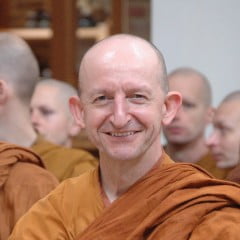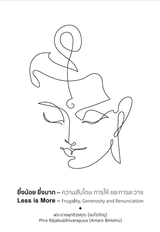The theme for this afternoon’s talk is ‘Less is More – Frugality, Renunciation and Generosity’. I will focus on the frugality and renunciation aspects first of all and then get to generosity later on. First of all, it struck me how, if we say that our usual philosophy in life is ‘more is better’, if ‘less is more’, then ‘less is better’ – if you...
Leer más
The theme for this afternoon’s talk is ‘Less is More – Frugality, Renunciation and Generosity’. I will focus on the frugality and renunciation aspects first of all and then get to generosity later on.
First of all, it struck me how, if we say that our usual philosophy in life is ‘more is better’, if ‘less is more’, then ‘less is better’ – if you follow the logic – which is a good way of summarizing this theme.
This is an important topic for our times. Probably the kind of people who gather together at a Buddhist monastery on a Sunday afternoon are not those overly committed to consumption (what we call the ‘consumer society’ as if we were just a mouth with legs on) but that doesn’t have to be the way we see ourselves, even though this is often the way that society and our value systems are conditioned to operate. In the very wonderful little book called Buddhist Economics by Venerable Payutto, a Thai philosopher monk, he succinctly describes classic economics as: ‘Maximum consumption leads to maximum happiness.’ It’s the basic ethic of the consumer society. The more you consume then the happier you are. Even though we might say, ‘I’m a Buddhist, I’m not like that!’ I think it’s helpful to reflect that, if we look around and we see our working life, our family life, the society we live in, a huge amount of our conditioning is like that. The more that you’ve got, the happier you should be, so there’s an enormous amount of drive to get more. Maybe it’s not physical possessions but at least more status or more Facebook followers or more Instagram followers, more likes, as well as the usual more property, more money and more approval and so forth. So that ‘more is better’ as an ethic for our society is very strong I would suggest; even if we’re not overtly materialistic, or we don’t see ourselves that way, that can still be a very powerful driving force. That said, this is also not solely a modern thing – the search for happiness through material possessions, through the sensory world – this has been part of our life in the human realm since distant ages past.


